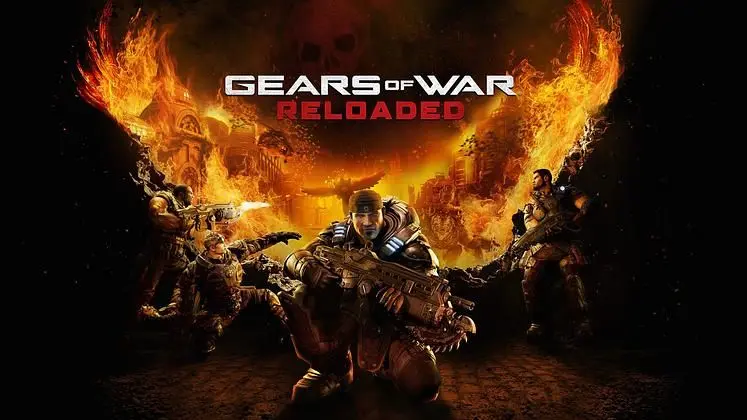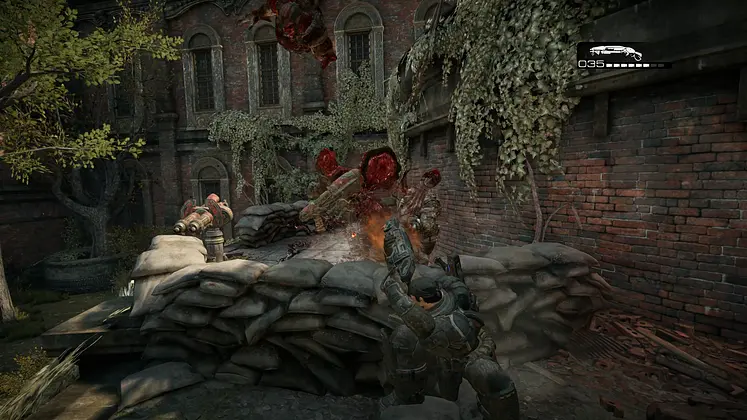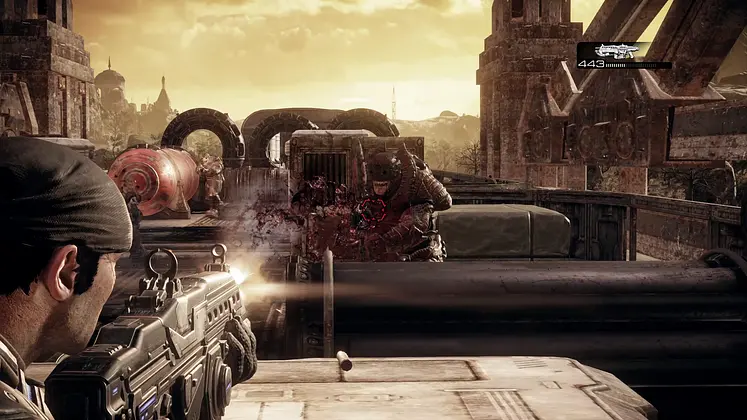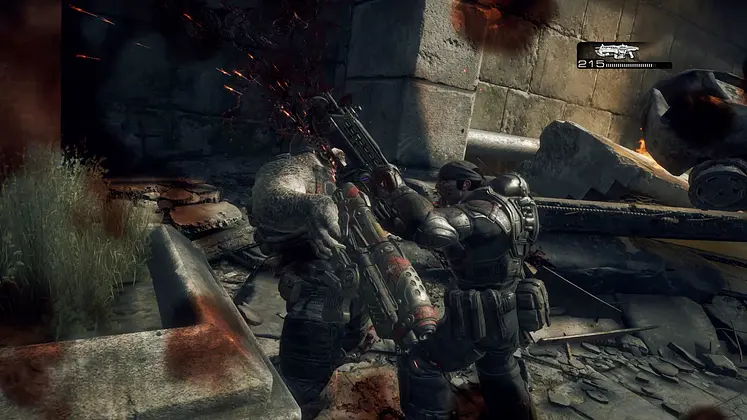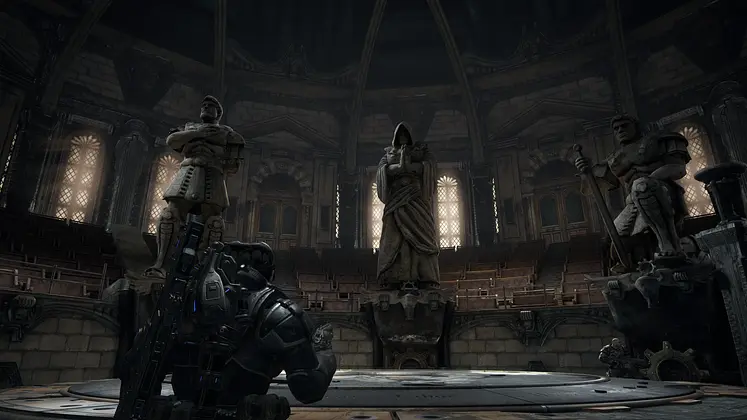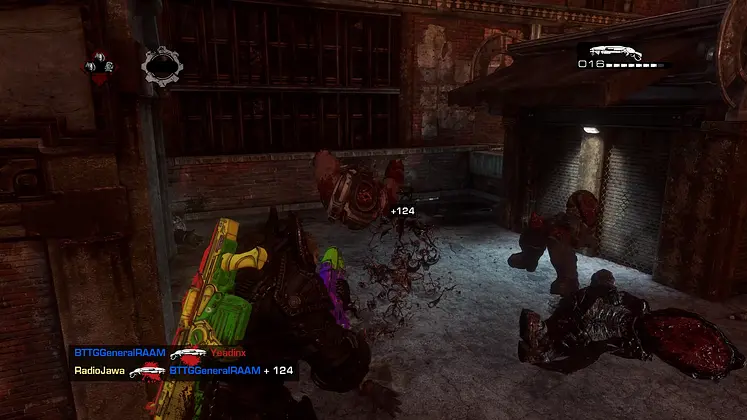Almost 20 years after it first launched, Gears of War is back for the second time. With Gears of War: E-Day’s release window nowhere in sight, this Reloaded remaster also represents an opportunity to remind veterans and rookies alike of the series’ important place in the history of the third-person shooter genre. But is this second refresh worth paying attention to beyond its historical and nostalgic value?
The timing is perfect for the Xbox division and Microsoft as a whole as the giant faces heavy criticism for its mishandling of several top-notch studios and massive layoffs and project cancellations pile up. Even worse, the BDS movement has set its sights on its AI business and how it’s used by Israel to accelerate the genocide of Palestinians in Gaza. Even if we put aside such crucial matters, IPs as once mighty as Halo are struggling to remain relevant as long-promised games fail to coalesce or reach the finish line. When you look at the larger picture, it’s easy to see why there’s so much riding on Gears of War as the company navigates several PR crises.
Exactly a decade ago, The Coalition gave the original Gears of War a new coat of paint as it prepared to usher in a new era for the franchise with Gears of War 4 (2016). While undoubtedly nicer-looking and more modern overall, that Ultimate Edition presented a number of issues, and more egregiously, didn’t give PC players the polished experience they deserved. With this Reloaded iteration, Xbox Game Studios, The Coalition, Sumo Digital, and Disbelief (the last two are co-developers) haven’t aimed too high regarding new functionalities, gameplay adjustments, or cutting-edge graphics, but this feels like the best way to experience the modern classic regardless.
There’s something satisfying but hard to properly describe about seventh-generation video games. The PS3/360 era represented the start of many of today’s problems with AAA development, yet most projects from huge publishers unwittingly hit the sweet spot between big-budget spectacle and sustainable development cycles with restrained (yet ambitious) scopes. In the case of Gears of War, it marked a turning-point for Xbox Live alongside Halo 3 and Call of Duty 4, and it’s easy to see why and how even today.
Getting through Gears of War: Reloaded’s campaign (playable in solo or co-op, just like you remember it) didn’t take me longer than 8 hours despite not having touched the first Gears since its original iteration hit PC and the fifth act having all the extra levels which came with the post-360 re-releases. Simply put, it’s a nearly perfect example of a ‘lean and mean’ video game, especially when you take into account its biggest ambition was to rework how third-person shooters played and to introduce proper cover mechanics.
The worldbuilding is as light as it can be and gets straight to the point while also teasing there’s more to the story; the roster of characters isn’t larger than it needs to be; and the plot is extremely focused. Long story short: On the Earth-like planet of Sera, the Locust Horde emerges to destroy the human civilization after the 79-year-long Pendulum Wars have left both sides of the conflict devastated. 14 years later, humanity is on the verge of extinction and COG commando Marcus Fenix is reinstated into the army to help deliver a killing blow to the Locust with a lightmass bomb.
More is revealed as the plot advances, but Gears of War is one of those action games that don’t stop moving and throwing exciting set pieces at the player, telling all they have to tell (very little) through deeds instead of exposition most of the time. To me, it always felt like the original Predator movie: There’s a small group of macho men deep into enemy territory and “ugly motherfuckers” are hunting them down (or trying to). If you add the whole ‘let’s nuke ‘em’ plot point and the fact it’s a literal horde going after them, maybe we could add Aliens to the mix of inspirations too. It just works.
19 years later, Gears of War undoubtedly feels ‘dated’ by today’s AAA standards, but it’s got a better rhythm than most action games from big studios coming out nowadays, and controls remarkably well. No open-world sections (Gears 5’s biggest flaw), no meta progression of any kind. Just cruise through the missions blasting Locust and picking up vicious guns as you go. Maybe Cole will throw in a couple of jokes or quips from time to time, preventing the adventure from becoming too gloomy. Likewise, new situations that slightly switch things up – using light sources to move safely through dark alleys, riding minecarts through a factory – help the campaign from ever getting stale. Before you even realize it, the credits are rolling and you’re as satisfied as back in 2006. Shame about the still wonky ally AI though.
Hacking through Locust soldiers with the Lancer assault rifle’s chainsaw still brings me immense puerile joy, I must report. The Gnasher shotgun is gaming’s scariest. Dropping nades right on top of emergence holes is as satisfying as in the old days. Gears of War is a blast which takes me back to simpler times, but also holds up when compared to most games that have tried to honor or replicate its formula, which explains why everyone’s ready for its return with a new installment (hopefully) in 2026. I also want to underline the importance of Kevin Riepl’s incredible soundtrack, which remains the series’ peak on the musical front.
That said, I can’t help but feel slightly disappointed by the thin work on the uplift done here. Whereas the framerate, resolution, lighting, and model improvements (especially for modern consoles) are instantly noticeable when compared to the previous remaster, no ray tracing of any kind (at least at launch and as far as I can tell) is a gigantic missed opportunity to seriously enhance its presentation for years to come. Sure, the new water reflections and shadows are nice, but they’re improvements you won’t be paying much attention to in the heat of battle. It could also be argued some sections are missing the extremely moody atmosphere of the original as a direct result of making the entire thing look more ‘natural’ (this isn’t always good). HDR makes most levels pop though.
With the Ultimate Edition already taking care of making Epic Game’s original vision shinier and sharper, Reloaded ends up feeling like yet another basic boost rather than a substantial upgrade. The upside is that, as a direct result, performance should be strong even when maxed out in most modern PC builds. In fact, it’s also releasing as ‘Steam Deck verified’ and I can confirm Valve’s little big machine can stay in the 50-60 FPS range at the pretty decent Medium graphical preset. As for consoles, 60 and 120 FPS modes are offered (even on Xbox Series S) and function exactly as advertised with a solid range of output resolutions to boot.
Perhaps more important is how Gears of War: Reloaded brings, for the first time ever, the series to PlayStation. If we take into account the PS5-exclusive control features like haptic feedback and adaptive triggers, that might be the most attractive version of Gears 1 moving forward. Don’t worry about being left out of the online action either, as cross-play and cross-progression are working across all consoles and PC (Steam & Xbox). It follows the recent trend of Xbox going all-out with its ports, and we’d like to see more pushes in that direction in the future.
While the online servers have been live for the entirety of the review period, finding matches has been impossible for obvious reasons, so stay tuned for our full thoughts once we’ve put some hours into its fast-paced and gory multiplayer matches. At this stage, however, I can say the lack of a Horde Mode in the vein of the sequels’ that’s adjusted to Gears of War’s maps and signature simplicity is a letdown. That addition could’ve breathed even more life into this old body.
UPDATED WITH FINAL THOUGHTS:
Random Microsoft account-related crashes at startup aside (going into Steam’s offline mode and reconnecting once in the main menu seems to take care of it), Gears of War: Reloaded gets multiplayer right. On top of the local/online co-op option for the story campaign, the Versus multiplayer includes all the modes, maps, and skins which were available in previous versions of the game. The Coalition has enabled 60Hz dedicated servers as well, which means the whole experience is more reliable and smoother.
Once I got past those startup hurdles, I must say I’ve been having a blast with Gears of War’s straight-to-the-point and zero-bloat online PvP modes. It might not be as packed or dynamic as its sequels’ offerings in that arena, but you’re instantly reminded of why it took over Xbox Live for years and gained a following. As always, watch out for the Gnasher-only vets, though the new 3D audio options makes the stomping much easier to notice.
All in all, Gears of War: Reloaded gets the job done and allows all current platforms (except Nintendo Switch 2) to enjoy one of the best and most important shooters ever made with a clean presentation and smooth framerates, yet it doesn’t go the extra mile to take advantage of the most recent graphical advancements or add new content which could’ve made it stand face to face with later entries in the series.
Gears of War: Reloaded is now available on PC (Steam & Xbox), PS5, and Xbox Series X/S for $39,99. It’s also launched into Game Pass Ultimate and PC Game Pass, plus it’s playable via Xbox Cloud Gaming.
GEARS OF WAR: RELOADED VERDICT
Gears of War’s second remaster isn’t a substantial makeover, and some rough edges linger, but small improvements pile up to make Reloaded the best way to experience a modern classic.
TOP GAME MOMENT
Defeating General RAAM on the first try after having trouble with him back in the day.
Good vs Bad
- Much cleaner image resolution and more natural lighting
- HDR support, Dolby Vision/Atmos, and 7.1 3D audio make it pop
- Performance is strong across all platforms
- New shadows and reflections clean up the presentation
- Smooth online experience with cross-platform features
- The game itself holds up remarkably well
- No Horde Mode or new content to make it truly fresh for veterans
- No ray tracing of any kind is a missed opportunity to future-proof it
- The AI could’ve used a tune-up
- Random crashes at startup and mission-breaking bugs tarnish the experience
